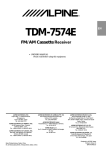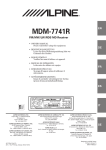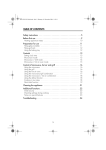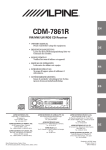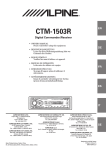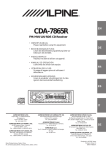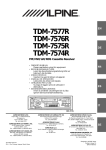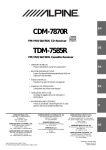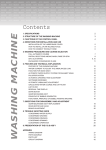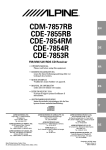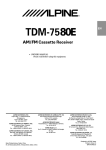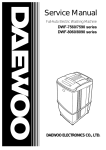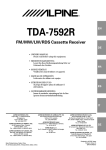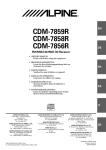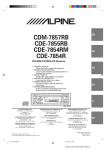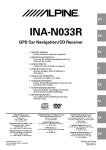Download Alpine TDM-7590R Owner`s manual
Transcript
R EN TDM-7590R FM/MW/LW/RDS Cassette Receiver DE • OWNER'S MANUAL Please read before using this equipment. • BEDIENUNGSANLEITUNG Lesen Sie diese Bedienungsanleitung bitte vor Gebrauch des Gerätes. FR • MODE D'EMPLOI Veuillez lire avant d’utiliser cet appareil. • MANUAL DE OPERACIÓN Léalo antes de utilizar este equipo. • ISTRUZIONI PER L’USO Si prega di leggere prima di utilizzare il attrezzatura. ES • ANVÄNDARHANDLEDNING Innan du använder utrustningen bör du läsa igenom denna användarhandledning. IT ALPINE ELECTRONICS, INC. Tokyo office: 1-1-8 Nishi Gotanda, Shinagawa-ku, Tokyo 141-8501, Japan Tel.: (03) 3494-1101 ALPINE ELECTRONICS OF AMERICA, INC. 19145 Gramercy Place, Torrance, California 90501, U.S.A. Tel.: 1-800-ALPINE-1 (1-800-257-4631) ALPINE ELECTRONICS OF CANADA, INC. Suite 203, 7300 Warden Ave. Markham, Ontario L3R 9Z6, Canada Tel.: 1-800-ALPINE-1 (1-800-257-4631) Meiyi Printing Factory, Dalian, China No. 28 Chang Qing Street, Xi Gang District, Dalian, China ALPINE ELECTRONICS OF AUSTRALIA PTY. LTD. 6-8 Fiveways Boulevarde Keysborough, Victoria 3173, Australia Tel.: (03) 9769-0000 ALPINE ELECTRONICS GmbH Kreuzerkamp 7-11 40878 Ratingen, Germany Tel.: 02102-45 50 ALPINE ITALIA S.p.A. Via C. Colombo 8, 20090 Trezzano Sul Naviglio MI, Italy Tel.: 02-48 47 81 ALPINE ELECTRONICS FRANCE S.A.R.L. (RCS PONTOISE B 338 101 280) 98, Rue De La Belle Etoile, Z.I. Paris Nord Il B.P. 50016 F-95945, Roissy, Charles De Gaulle Cedex, France Tel.: 01-48 63 89 89 ALPINE ELECTRONICS OF U.K., LTD. 13 Tanners Drive, Blakelands, Milton Keynes MK14 5BU, U.K. Tel.: 01908-61 15 56 ALPINE ELECTRONICS DE ESPAÑA, S.A. Portal De Gamarra 36, Pabellón 32 01013 Vitoria (Alava)-Apdo. 133, Spain Tel.: 34-45-283588 Designed by ALPINE Japan Printed in China (Y) 68P01434K92-O SE CD changer for TDM-7590R. CD-Wechsler für TDM-7590R. Changeur CD pour TDM-7590R. Cambiador de CD para TDM-7590R. Cambia CD per TDM-7590R. CD-växlare för TDM-7590R. CHA-S624 CHA-1214 CHM-S620 Alpine CD Changers Give You More! More musical selections, more versatility, more convenience. An Alpine CD Changer adds more musical choices to your sound system. All models can be controlled from Alpine head units and deliver excellent sound quality. The CHA-S624 is a high-performance 6-disc changer with a new M DAC, Ai-NET compatibility, Optical Digital Output, 150 Disc Title Memory and CD TEXT. The CHA-1214 Ai-NET model holds 12 discs, and the CHM-S620 M-Bus model is a super-compact 6-disc changer. Von Alpine CD-Wechslern haben Sie mehr! Mehr Musikauswahl, mehr Vielseitigkeit, mehr Komfort. Mit einem Alpine CD-Wechsler erweitern Sie die Musikauswahl Ihres Systems. Sämtliche Modelle lassen sich von einer AlpineBedieneinheit aus steuern und liefern hervorragende Klangqualität. Der CHA-S624 ist ein Ai-NET-kompatibler Hochleistungs-Wechsler für 6 CDs mit dem neuen M-DAC, Digitalausgang für Glasfaserkabel, CD-Titelspeicher für 150 Titel und CD-TEXT. Das Ai-NETModell CHA-1214 nimmt 12 CDs auf, und der M-Bus-kompatible CHM-S620 ist ein superkompakter Wechsler für 6 CDs. Changeurs de CD Alpine : vous avez le choix! Plus de sélections musicales, plus de souplesse, plus de confort. Un changeur de CD Alpine permet d'augmenter la plage des sélections musicales de votre système embarqué. Tous les modèles peuvent être contrôlés à partir des autoradios Alpine et offrent une excellente qualité audio. Le modèle CHA-S624 est un changeur 6 disques ultra performant compatible Ai-NET et équipé d'un convertisseur N/A standard, d'une sortie optique numérique, d'une mémoire d'une capacité de 150 titres et de la fonction CD TEXT. Le modèle CHA-1214 Ai-NET peut contenir 12 disques. Le modèle CHM-S620 MBus est un changeur 6 disques super compact. ¡Los cambiadores Alpine de CD le ofrecen más! Más selecciones musicales, más versatilidad y más ventajas. Un cambiador Alpine de CD añade más opciones musicales a su equipo de sonido. Todos los modelos pueden controlarse desde las unidades principales de Alpine y proporcionar un sonido de calidad excepcional. El modelo CHA-S624 es un cambiador de 6 discos de alto rendimiento con el nuevo DAC "M" y compatibilidad con Ai-NET, salida digital óptica, memoria de títulos de 150 discos y TEXTO CD. El modelo CHA-1214 Ai-NET admite 12 discos y el modelo CHM-S620 Bus-M es un cambiador de 6 discos y tamaño reducido. I caricatori CD Alpine danno di più! Più scelta, più versatilità, più comodità. Un caricatore CD Alpine offre maggiore scelta. Tutti i modelli possono essere controllati tramite le unità di controllo Alpine e producono un suono di qualità eccellente. CHA-S624 è un caricatore a 6 dischi Ai NET compatibile e dotato di un nuovo M DAC, di un'uscita ottica digitale, memorizzazione dei titoli di 150 dischi e CD TEXT. Il modello CHA-1214 Ai NET può contenere un massimo di 12 dischi, mentre il modello CHM-S620 M-Bus è un caricatore a 6 dischi ultra compatto. Alpines CD-växlare ger mer! Fler musikval, mer variation, större bekvämlighet. Med Alpines CD-växlare i systemet får du större musikalisk valfrihet. Alla modeller kan styras från Alpines huvudenheter och ger enastående ljudkvalitet. CHA-S624 är en högpresterande växlare för 6 skivor med en ny M D/A-omvandlare, kompatibel med Ai-NET, optisk digitalutgång, titelminne för 150 skivor och CD-TEXT. Modellen CHA-1214 Ai-NET rymmer 12 skivor och modellen CHMS620 M-Bus är en superkompakt växlare för 6 skivor. ENGLISH Contents Operating Instructions WARNING WARNING .................................................. 2 CAUTION ................................................... 2 PRECAUTIONS ......................................... 2 Basic Operation Detaching the Front Panel ................................. 4 Attaching the Front Panel ................................. 4 Initial System Start-Up ..................................... 4 Turning Power On and Off ............................... 4 Display Angle Adjustment ................................ 5 Subwoofer On and Off ...................................... 5 Adjusting Source Signal Levels ........................ 5 Adjusting Volume/Balance (Between Left and Right)/Fader (Between Front and Rear) ........ 5 Selecting BBE Mode ........................................ 6 Setting the BASS Control ................................. 6 Setting the Treble Control ................................. 7 Changing Audio Level Display Pattern ............ 7 Setting the AUX Mode ...................................... 7 Radio Operation Manual Tuning .................................................. 8 Setting Frequency Step ..................................... 8 Automatic Seek Tuning .................................... 8 Manual Storing of Station Presets .................... 9 Automatic Memory of Station Presets .............. 9 Tuning to Preset Stations .................................. 9 RDS Operation Setting RDS Reception Mode and Receiving RDS Stations ............................................... 10 Recalling Preset RDS Stations ........................ 10 Receiving RDS Regional (Local) Stations ..... 11 Receiving Traffic Information ......................... 11 PTY (Programme Type) Tuning ..................... 11 Receiving Traffic Information While Playing Tape or Radio .............................................. 12 Priority News .................................................. 12 Cassette Player Operation Opening and Closing the Movable display ..... 13 Normal Play and Pause ................................... 13 Dolby B NR (Noise Reduction) ...................... 14 Repeat Play ..................................................... 14 Blank Skip (B.SKIP) ....................................... 14 Fast Forward and Rewind ............................... 14 Scanning Programmes .................................... 15 Manual Reverse .............................................. 15 Programme Sensor (P.S.) ................................ 15 * Dolby noise reduction manufactured under license from Dolby Laboratories Licensing Corporation. "DOLBY" and the double-D symbol are trademarks of Dolby Laboratories Licensing Corporation. CD Changer Operation Controlling CD Changer (Optional) ............... 16 Music Sensor (M.S.) Skip ............................... 16 Fast Forward and Backward ........................... 16 Repeat Play on Single Track or Entire Disc ... 17 M.I.X. (Random) Play .................................... 17 Scanning Programmes .................................... 17 Remote Control Operation Controls on Remote Control ........................... 18 Battery Replacement ....................................... 19 Information In Case of Difficulty ....................................... 20 Specifications .................................................. 21 Installation and Connections Warning ........................................................... 22 Caution ............................................................ 22 Precautions ...................................................... 22 Installation ...................................................... 23 Connections .................................................... 24 1-EN WARNING CAUTION This symbol means important instructions. Failure to heed them can result in injury or material properly damage. WARNING This symbol means important instructions. Failure to heed them can result in serious injury or death. DO NOT OPERATE ANY FUNCTION THAT TAKES YOUR ATTENTION AWAY FROM SAFELY DRIVING YOUR VEHICLE. Any function that requires your prolonged attention should only be performed after coming to a complete stop. Always stop the vehicle in a safe location before performing these functions. Failure to do so may result in an accident. KEEP THE VOLUME AT A LEVEL WHERE YOU CAN STILL HEAR OUTSIDE NOISE WHILE DRIVING. Failure to do so may result in an accident. DO NOT DISASSEMBLE OR ALTER. HALT USE IMMEDIATELY IF A PROBLEM APPEARS. Failure to do so may cause personal injury or damage to the product. Return it to your authorized Alpine dealer or the nearest Alpine Service Centre for repairing. DO NOT PLACE HANDS, FINGERS OR FOREIGN OBJECTS IN INSERTION SLOTS OR GAPS. Doing so may result in personal injury or damage to the product. DO NOT MIX NEW BATTERIES WITH OLD BATTERIES. INSERT WITH THE CORRECT BATTERY POLARITY. When inserting the batteries, be sure to observe proper polarity (+ and –) as instructed. Rupture or chemical leakage from the battery may cause fire or personal injury. Doing so may result in an accident, fire or electric shock. USE THIS PRODUCT FOR MOBILE 12V APPLICATIONS. PRECAUTIONS Temperature Use for other than its designed application may result in fire, electric shock or other injury. Be sure the temperature inside the vehicle is between +60°C (+140°F) and –10°C (+14°F) before turning your unit on. USE THE CORRECT AMPERE RATING WHEN REPLACING FUSES. Maintenance DO NOT BLOCK VENTS OR RADIATOR PANELS. If you have problems, do not attempt to repair the unit yourself. Return it to your Alpine dealer or the nearest Alpine Service Station for servicing. Doing so may cause heat to build up inside and may result in fire. Installation Location Failure to do so may result in fire or electric shock. KEEP SMALL OBJECTS SUCH AS BATTERIES OUT OF THE REACH OF CHILDREN. Swallowing them may result in serious injury. If swallowed, consult a physician immediately. Make sure the TDM-7590R will not be installed in a location subjected to: • • • • Direct sun and heat High humidity and water Excessive dust Excessive vibrations Handling the Detachable Front Panel • Do not expose to rain or water. • Do not drop or apply shock. 2-EN Tape Slack Check and make sure any slack in the tape is taken up before inserting the tape into the unit. A loose tape can get caught in the mechanism and cause damage to the unit and the tape itself. Tighten the tape by inserting a pencil or a similar instrument into the spindle hole and turn until all the slack has been taken up. FR Excessively Thin Tape C-120 type cassette tapes are not recommended for use in automobile tape players. Precision Tape Mechanism Prevent any foreign objects from entering the cassette opening as the precision mechanism and tape head may be damaged. Never play dirty or dusty tapes – they can damage the tape head. ES Tape Head Cleaning Periodic cleaning (approximately every 20 hours of use) of the tape head with a wet type head-cleaning cassette tape (available at audio stores) is necessary for best performance. DE Fuse Replacement When replacing the fuse(s), the replacement must be of the same amperage as shown on the fuse holder. If the fuse blows more than once, carefully check all electrical connections for shorted circuitry. Also have your vehicle's voltage regulator checked. IT SE 3-EN Basic POWER BAND 6 g DN f UP 5 RESET MODE ANGLE SETUP Basic Operation Detaching the Front Panel 1 2 3 Press the POWER button for more than 3 seconds to turn off the power. Press the (Release) button at upper left side until the front panel pops out. Grasp the left side of the front panel and pull it out. • Compatibility with Factory Steering Wheel Radio Controls If your vehicle has steering wheel controls for the radio, an optional steering wheel control interface may be available to connect your Alpine radio. For details, contact your Alpine dealer. Initial System Start-Up NOTES • The front panel may become hot in normal usage (especially the connector terminals), this is not malfunction. • To protect the front panel, place it in the supplied carrying case. Immediately after installing or applying power to the unit, it should be initialized. Press the RESET switch with a ballpoint pen or any other pointed object. Turning Power On and Off 1 Attaching the Front Panel 1 2 First, insert the right side of the front panel into the main unit. Align the groove on the front panel with the projections on the main unit. Push the left side of the front panel until it locks firmly into the main unit. 2 1 NOTE Before attaching the front panel, make sure that there is no dirt or dust on the connector terminals and no foreign object between the front panel and the main unit. 4-EN Press the POWER button to turn on the unit. NOTE The unit can be turned on by pressing any other button except the c button. The volume level gradually increases to the previous level you were listening to before the unit was turned off. Press the POWER button for more than 3 seconds to turn off the unit. NOTE The very first time the power is turned on, the volume will start from level 12, the BBE will be on in the tuner mode. Basic Display Angle Adjustment Movable display Adjusting Source Signal Levels If the difference in volume level between the CD player and FM radio is too great, adjust the FM signal level as follows. 1 The movable display may be adjusted to 3 different angles depending upon user preference. 1 Press the ANGLE button to adjust the angle of the movable display. NOTES • The display will close a half minute after the ignition key is turned to the OFF position. • The adjusted angle of the display is stored in memory. There is no need to re-adjust the angle when the power is turned back on. CAUTION Keep hands (or any other object) away from the display while it is opening or closing to avoid damage or injury. The back of the movable display will get very warm under normal operating conditions. This is not a malfunction. Do not touch. Subwoofer On and Off 1 2 2 Press and hold the SETUP button for at least 3 seconds. 3 4 Press the BAND button to select the FM signal level HI (High) or LO (Low) to make the signal levels between the FM band and CD player and cassette player closer. 1 ES Press the MODE button repeatedly to choose the desired mode. Each press changes the modes as follows: → VOL → BAL → FAD NOTES • If the 5 or 6 button is not pressed in 5 seconds after selecting the BAL, or FAD mode, the unit automatically sets in the VOL mode. • When the subwoofer, BBE mode is set to ON, the level of the subwoofer, BBE can be adjusted. Press the BAND button to select SUB-W ON or SUBW OFF. After setting is completed, press the SETUP button to return to normal mode. 2 FR After setting is completed, press the SETUP button to return to normal mode. Adjusting Volume/Balance (Between Left and Right)/Fader (Between Front and Rear) Press the g DN or f UP button to select the SUB mode. NOTES • Initial mode is "SUB-W ON." • Set to "SUBW OFF" unless the subwoofer is used. • When the subwoofer is turned on, the subwoofer output level can be adjusted. For more details, refer to the Adjusting Volume/Balance/Fader section on page 5. Press the g DN or f UP button to select the FM signal level mode. → FM LV ←→ REG ←→ SUB ← → AUX ←→ 100kHz/50kHz ← → FM LV ←→ REG ←→ SUB ← → AUX ←→ 100kHz/50kHz ← 3 4 Press and hold the SETUP button for at least 3 seconds. DE IT Press the 5 or 6 button until the desired sound is obtained in each mode. SE 5-EN Basic BAND 6 DISP BBE SOURCE g DN f UP BASS C. TREBLE C. 5 SETUP Basic Operation Selecting BBE Mode The BBE (Barcus Berry Electronics) processor installed in this unit is designed to correct the phase distortion inherent in most loudspeaker designs. Ensuring the phase integrity of the signal driving the speakers improves the accurate reproduction of the sound. 1 2 3 Press and hold the BBE button for at least 2 seconds to turn BBE on. Each press toggles between the BBE on and off modes. In BBE mode, press the BBE button to switch to the BBE adjusting mode. Setting the Bass Control You can change the Bass Frequency emphasis to create your own tonal preference. 1 Press the BASS C. button to turn on the Bass setting mode. 2-1 Setting the Bass frequency: Press the g DN or f UP button to select the desired Bass centre frequency. 60Hz ↔ 80Hz ↔ 100Hz ↔ 200Hz Emphasizes the displayed Bass frequency ranges. 2-2 Setting the Bass Band Width (Q-Factor): NOTE In BBE adjusting mode, wait 5 seconds without pressing any button. The BBE adjusting mode is turned OFF. Press the BAND button to select the desired Bass Band Width. → WIDE1 → WIDE2→ WIDE3 → WIDE4 (Wide)← ........................... →(Narrow) To change to a desired BBE level, press the 5 or 6 buttons. The BBE level can be changed from +1 to +3. Changes the displayed frequency's band width to wide or narrow. 2-3 Setting the Bass Level: Press the 5 or 6 button to select the desired Bass Level (-7~+7). You can emphasize or weaken the bass frequency. NOTES • If no buttons are pressed within 5 seconds, the Bass control setting will be turned off automatically. • The settings of the Bass will be individually memorized for each source (FM, MW (LW), tape, changer and AUX) until the setting is changed. 6-EN Basic Setting the Treble Control DISP2: Lights the mode and value bars to show the settings in the Bass engine display. You can change the Treble Frequency emphasis to create your own tonal preference. 1 Example settings: Bass centre frequency: 100 Hz Bass band width: WIDE1 Bass level: - 6 Press the TREBLE C. button to turn on the Treble setting mode. 2-1 Setting Treble frequency: NOTE The last mode set will remain in effect. The mode and value bars light and show the Bass engine settings. Press g DN or f UP button to select the desired Treble center frequency. 10kHz ↔ 12.5kHz ↔ 15kHz ↔ 17.5kHz DISP OFF: Turns off the light in Bass engine display. If you set DISP OFF, the Volume indicator, Audio Level indicator, and Bass engine displays are not lit at all times. Emphasizes the displayed Treble frequency ranges. 2-2 Setting Treble Level: Press the 5 or 6 button to select the desired Treble Level (-7~+7). You can emphasize the treble frequency. NOTES • If no buttons are pressed within 5 seconds, the Treble control setting will be turned off automatically. • The settings of the Treble will be individually memorized for each source (FM, MW (LW), tape, changer and AUX) until the setting is changed. Changing Audio Level Display Pattern 1 Setting the AUX Mode You can input TV/video sound by connecting an optional "M-Bus V-Link" (M-Bus/RCA interface cable KCM-122B) to this component. 1 2 ES Press and hold the SETUP button for at least 3 seconds. Press the g DN or f UP button to select the AUX mode. → FM LV ←→ REG ←→ SUB ← → AUX ←→ 100kHz/50kHz ← Press the DISP button to switch the display pattern. → DISP1 FR DE → DISP2 → DISP OFF DISP1: Lights the Volume indicator and Audio Level indicator. 3 4 Volume indicator 5 Audio Level indicator Press the BAND button to toggle the mode between AUX ON and AUX OFF. Press the SETUP button to return to normal mode. To adjust the volume, etc., first press the SOURCE button and select the AUX mode, then make the necessary adjustment. IT → TUNER → TAPE → AUX NOTE When AUX ON is selected, a CD Changer cannot be used. 7-EN SE Radio SOURCE TUNE/A.ME g DN f UP BAND SETUP Preset buttons (1 through 6) Radio Operation Manual Tuning 1 2 Press the SOURCE button until a radio frequency appears in the display. 4 the unit tunes in FM stations every 50 kHz automatically. 100 kHz: the unit tunes in FM stations every 100 kHz automatically 4 Automatic Seek Tuning NOTE The initial mode is DX SEEK. 1 Press the g DN or f UP button to move downward or upward one step respectively until the desired station frequency is displayed. 2 Setting Frequency Step 3 Press and hold the SETUP button for at least 3 seconds to enter the Setting mode. Press the g DN or f UP button to select the frequency step mode. → FM LV ←→ REG ←→ SUB ← → AUX ←→ 100kHz/50kHz ← 8-EN Press the SOURCE button until a radio frequency appears in the display. Press the BAND button repeatedly until the desired radio band is displayed. Each press changes the band: → F1 → F2 → MW → LW When you tune in FM stations automatically, you can set the frequency step to 50kHz or 100 kHz. 2 Press the SETUP button to exit the setting mode. Press the TUNE button repeatedly until “DX SEEK” and “SEEK” disappear from the display. NOTE The ST indicator appears on the display when a Stereo FM station is tuned in. 1 Press the BAND button to select the desired frequency step (50 kHz or 100kHz.) Each time you press the BAND button, 50 kHz and 100 kHz appear alternately. 50 kHz: Press the BAND button repeatedly until the desired radio band is displayed. Each press changes the band: → F1 → F2 → MW → LW 3 3 4 Press the TUNE button to illuminate the DX and SEEK indicators in the display. With the DX (Distance) mode activated, both strong and weak stations will be tuned in the Auto-Seek operation. Press again to return to the local mode. The DX indicator will turn off and the SEEK indicator will remain illuminated. Now, only strong stations will be tuned. Press the g DN or f UP button to automatically seek for a station downward or upward respectively. The unit will stop at the next station it finds. Press the same button again to seek the next station. Radio Manual Storing of Station Presets 1 2 3 4 Select the radio band and tune in a desired radio station you wish to store in the preset memory. Press and hold any one of the Preset buttons (1 through 6) for at least 2 seconds until the station frequency on the display blinks. Press the Preset button into which you wish to store the station while the frequency display is blinking (within 5 seconds). The display stops blinking once the station has been memorized. The display shows the band, preset No. with a triangle (9) and station frequency memorized. Automatic Memory of Station Presets 1 2 3 Repeat the procedure to store up to 5 other stations onto the same band. To use this procedure for other bands, simply select the band desired and repeat the procedure. A total of 24 stations can be stored in the preset memory (6 stations for each band; F1, F2, MW and LW). NOTE If you store a station in a preset memory which already has a station, the current station will be cleared and replaced with the new station. Press the SOURCE button to select the radio mode. Press the BAND button repeatedly until the desired radio band is displayed. Press and hold the A. ME button for at least 2 seconds. The frequency on the display continues to change while the automatic memory is in progress. The tuner will automatically seek and store 6 strong stations in the selected band. They will be stored into presets 1 to 6 buttons in order of signal strength. When the automatic memory has been completed, the tuner goes to the station stored in the preset location No. 1. NOTE If no stations are stored, the tuner will return to the original station you were listening to before the auto memory procedure began. FR ES Tuning to Preset Stations 1 2 3 Press the SOURCE button to select the radio mode. Press the BAND button repeatedly until the desired band is displayed. DE Press the station Preset button that has your desired radio station in memory. The display shows the band, preset number with a triangle and frequency of the station selected. IT SE 9-EN RDS BAND T.INFO g DN f UP AF SETUP/F PTY Preset buttons (1 through 6) RDS Operation Setting RDS Reception Mode and Receiving RDS Stations The RDS (Radio Data System) is a radio information system using the 57 kHz subcarrier of regular FM broadcast. The RDS allows you to receive a variety of information such as traffic information, station names, and to automatically re-tune to a stronger transmitter that is broadcasting the same programme. 1 2 Press the AF button to activate the RDS mode. Press the g DN or f UP button to tune in the desired RDS station. NOTE When the BAND button is pressed and held for more than 2 seconds while a station name is displayed, the display shows the station frequency for 5 seconds. 3 Press the AF button again to deactivate the RDS mode. Tips The RDS digital data includes the followings: PI Programme Identification PS Programme Service Name AF List of Alternative Frequencies TP Traffic Programme TA Traffic Announcement PTY Programme Type EON Enhanced Other Networks 10-EN Recalling Preset RDS Stations 1 2 3 Press the AF button to activate the RDS mode. The display shows "AF" when the RDS mode is activated. Make sure that the F indicator light goes out, then press the preset button in which your desired RDS station is preset. If the preset station's signal is weak, the unit automatically searches and tunes to a stronger station in the AF (Alternative Frequencies) list. If the preset station and the stations in the AF list cannot be received: Press the same preset button again within 5 seconds to have the unit search for a station in the PI (Programme Identification) list. If there are still no stations receivable in the area, the unit displays the frequency of the preset station and the preset indicator disappears. If the signal level of the Regional (Local) station being tuned becomes too weak to receive, press the same preset button to tune in a Regional station in other district. NOTE For presetting the RDS stations, refer to the Radio Operation section. The RDS stations can be preset in the F1 and F2 bands only. RDS Receiving RDS Regional (Local) Stations PTY (Programme Type) Tuning 1 1 2 2 Press and hold the SETUP button for at least 3 seconds to activate the setting mode. Press the g DN or f UP button to select the REG (Regional) mode. → FM LV ←→ REG ←→ SUB ← → AUX ←→ 100kHz/50kHz ← 3 4 Press the BAND button to turn on or off the REG (Regional) mode. In the REG OFF mode, the unit automatically keeps receiving the related local RDS station. Press the SETUP button to deactivate the setting mode. 2 3 Press the T.INFO button repeatedly until the T.INFO indicator appears in the display. Press the g DN or f UP button to select your desired traffic information station. When a traffic information station is tuned in, the TP indicator lights up. Traffic information is heard only when it is being broadcast. If traffic information is not being broadcast, the unit is set in the standby mode. When a traffic information broadcast begins, the unit automatically receives it and the display shows "TRF-INFO" for a few seconds and returns to the PS display. Press the PTY button to activate the PTY mode. The Programme Type of the station being currently received will be displayed for 5 seconds. • If there is no receivable PTY broadcast, "NO PTY" will be displayed for 5 seconds. • If no RDS station can be received the display shows "NO PTY." NOTE If no button is pressed within 5 seconds after pressing the PTY button, the PTY mode will be automatically cancelled. Receiving Traffic Information 1 Press the F button so that the F indicator lights up. Press the g DN and f UP buttons within 5 seconds after activating the PTY mode to choose the desired programme type while the PTY (programme type) is being displayed. Each press scrolls the programme type by one. FR LIGHT M ← CLASSICS → OTHER M 4 Press the PTY button within 5 seconds after selecting the programme type to start searching for a station in the selected programme type. The chosen programme type indicator blinks during searching and lights when a station is found. ES If no PTY station is found, "NO PTY" will be displayed for 2 seconds. 5 Press the F button to activate the normal mode. The F indicator light goes out. DE When the traffic information broadcast is over, the unit will automatically set in the standby mode. NOTES • If the traffic information broadcast signal falls below a certain level, the unit remains in the receiving mode for 1 minute. If the signal remains below a certain level for over 1 minute, the "T.INFO" indicator blinks. • If you do not want to listen to the traffic information being received, lightly press the T.INFO button to skip that traffic information message. The T. INFO mode will remain in the ON position to receive the next traffic information message. • If the volume level is changed while receiving traffic information, the changed volume level will be memorized. When traffic information is received next time, the volume level will be automatically adjusted to the level memorized. IT SE 11-EN RDS T.INFO g DN f UP F NEWS RDS Operation Receiving Traffic Information While Playing Tape or Radio 1 2 Press the T.INFO button repeatedly until the T.INFO indicator appears in the display. Press the g DN and f UP buttons to select a traffic information station if necessary. • When a traffic information broadcast starts, the unit automatically mutes the changer or the cassette player or the regular FM broadcast. • When the traffic information broadcast finishes, the unit automatically returns to the original source play before the traffic information broadcast began. When traffic information stations cannot be received: In the tuner mode: When the TP signal can no longer be received for over 1 minute, the "T.INFO" indicator blinks. In the tape mode: When the TP signal can no longer be received, the traffic information station of another frequency will be selected automatically. NOTE The receiver is equipped with the EON (Enhanced Other Networks) function in order to keep track of additional alternate frequencies to the AF list. The EON indicator appears while an RDS EON station is being received. If the station being received does not broadcast the traffic information, the receiver automatically tunes in the related station that broadcasts the traffic information when it occurs. 3 Press the T.INFO button to deactivate the Traffic Information mode. The T.INFO indicator disappears. 12-EN Priority News This function allows you to preset to give priority to the News programme. You will never miss the News programme as the unit automatically gives priority to the News programme whenever it begins broadcasting, and interrupts the programme you are currently listening. This feature is functional when your unit is set to a mode other than the LW and MW modes. 1 2 Press the F button so that the F indicator lights up. Press the NEWS button to activate the PRIORITY NEWS mode. "NEWS" lights up in the display. • To disable the PRIORITY NEWS function, press the NEWS button. NOTE In the PRIORITY NEWS function, unlike in the T.INFO function, the volume does not increase automatically. 3 Press the F button to activate the normal mode. The F indicator light goes out. Cassette SOURCE :/J c Cassette Player Operation Opening and Closing the Movable display 1 2 Press the c button. The movable display will open. To close the movable display, press the c button again. The movable display will close. CAUTION Keep hands (or any other object) away from the display while it is opening or closing to avoid damage or injury. The back of the movable display will get very warm under normal operating conditions. This is not a malfunction. Do not touch. Normal Play and Pause 1 Press the c button. The movable display will open. Insert a cassette tape into the slot with the open side facing right. ES When a cassette is already inserted, press the SOURCE button to switch to the TAPE mode. The mode will change every time the button is pressed. → TUNER → TAPE → CD CHANGER∗ (Movable display fully opened) NOTES • Do not apply shock to the movable display when it is open as it may result in malfunction of the unit. • The display may be dim during low temperatures and immediately after turning on the power. The brightness will return to normal as time elapses. • The display will stop at the set angle when closing. FR Insert a cassette (or press the source button to switch from the tuner or CD Changer mode if a cassette is already inside the tape player). The player begins playback. The display shows "TAPE" and " or " during tape playback to show the tape side being played. When the end of the tape is reached, the unit automatically stops and reverses the tape to play the other side of the tape. (∗ Only when the CD changer is connected) 3 4 DE Press the :/J button to pause the tape playback. The display shows "PAUSE." Press again to resume the tape playback. Press the c button to stop the tape play and eject the cassette. The tape-direction indicator disappears. NOTES • When power is turned off or the front panel is removed, the full-logic mechanism will automatically switch to the PAUSE mode. This protects the tape from being deformed by the pinch-rollers if left for long periods. • Auto Metal When a metal cassette tape is inserted, the player automatically adjusts to the equalization for metal or any other high bias tape for optimum sound. • If the cassette tape does not eject, press the c button again for at least 3 seconds. 13-EN IT SE Cassette PROG P.S.DN P.S.UP g DN f UP B NR B.SKIP REPEAT SCAN Cassette Player Operation Dolby B NR (Noise Reduction) Blank Skip (B.SKIP) 1 1 After inserting a Dolby B NR encoded tape, press the B NR button. The display shows the "B NR" The tape noise is reduced in the Dolby NR mode when a Dolby B NR encoded tape is played. Press the B NR button to cancel the Dolby NR mode. Press the B.SKIP button during tape play to skip over blank portions of the tape lasting 15 seconds or longer, "B.SKIP" appears on the display. Press the B.SKIP button to cancel the blank skip mode. "B.SKIP" disappears from the display. Fast Forward and Rewind Repeat Play 1 1 Press the REPEAT button to play back repeatedly the current programme being played. The RPT indicator appears and the programme will be played repeatedly. Press the REPEAT button to stop the repeat play. The RPT indicator disappears. 2 14-EN Press the g DN or f UP button during tape play to fast rewind or forward the tape respectively. The tape side indicator ( or ) blinks and >> or << moves indicating the direction of the tape. When the end of the tape is reached in the rewind mode, the player stops automatically and begins playing from the beginning of the same side. When the end of the tape is reached in the fast forward mode, the player stops automatically and begins playing from the beginning of the opposite side. Press the f UP button during forwarding to stop fast forwarding and resume tape play. Press the g DN button during rewinding to stop rewinding and resume tape play. The tape side indicator stops blinking. Cassette Scanning Programmes 1 Press the SCAN button to play the first 10 seconds of each programme on the tape. "SCAN" appears on the display. Press the SCAN button to cancel the scanning when the desired programme is found. NOTE The SCAN operation cannot detect blank sections of less than 4 seconds. Manual Reverse 1 Press the PROG button during tape play to change the tape direction to play the other side of the tape. ) change to The tape side indicators ( and show which side of the cassette is being played. FR Programme Sensor (P.S.) 1 Press the P.S. DN button once during tape play to return to the beginning of the current selection being played. If you wish to return to a selection further back, press repeatedly until the number of selections you would like to skip is shown in the display. The display will show PS-1 with the first press and will increase by one with each successive press up to PS-9. The tape indicator will blink showing the direction of your search. ES DE Press the P.S. UP button once during tape play to advance to the beginning of the next selection. If you wish to advance to a selection further ahead, press repeatedly until the number of selections you would like to skip is shown in the display. The display will show PS+1 with the first press and will increase with each successive press up to PS+9. The tape indicator will blink showing the direction of your search during searching operation. IT NOTES • The programme sensor feature is functional in the tape play mode only. • You can advance to the 9th (max.) programme or return to the 8th (max.) programme. SE 15-EN Changer SOURCE g DN :/J f UP Disc Select buttons (1 through 6) F M.I.X. REPEAT SCAN CD Changer Operation Controlling CD Changer (Optional) If an optional Alpine 6-disc CD Changer (M-Bus) is connected to the 8-pin DIN connector of the TDM-7590R, you can control the CD Changer using the TDM-7590R. Music Sensor (M.S.) Skip 1 NOTE The CD controls on the TDM-7590R for the CD operation are functional only when the CD Changer is interconnected with the TDM-7590R. 1 2 Press the f UP button once to advance to the beginning of the next track. If you wish to advance to a track further ahead, press repeatedly until the desired track is reached. Press the SOURCE button to activate the CD Changer mode. The display shows the disc number and track number. NOTE To start play or pause play, press the :/J button. Press the Disc Select buttons (1 through 6) corresponding to one of the discs loaded in the CD Changer. The selected disc number appears in the display and CD playback starts. NOTE If the "F" indicator is illuminated the Disc Select buttons become nonfunctional. 16-EN Press the g DN button once to return to the beginning of the current track. If you wish to return to the beginning of a track further back, repeatedly press until you reach the desired track. NOTE The music sensor feature is functional in the play or pause mode. Fast Forward and Backward 1 Press and hold the g DN or f UP button to quickly move backward or forward respectively until you reach the desired portion. NOTE This feature works only in the CD playback mode. Changer Repeat Play on Single Track or Entire Disc 1 2 Press the F button so that the "F" indicator lights up. Scanning Programmes 1 2 Press the REPEAT button to display "RPT" or "RPT ALL" to play back repeatedly the track being currently played or the entire disc selected. Press the F button to activate the normal mode. The "F" indicator light goes out. Press the SCAN button to play the first 10 seconds of each track on the disc. The display shows the disc number, "SCAN", and track number being played during scan play. Press to the SCAN button to cancel scan play and resume normal play. NOTE Single track cannot be repeated during M.I.X. play. 3 Press the F button so that the "F" indicator lights up. 3 Press the F button to activate the normal mode. The "F" indicator light goes out. FR M.I.X. (Random) Play 1 2 Press the F button so that the "F" indicator lights up. Press the M.I.X. button while the CD is playing or in the Pause mode. The M.I.X. indicator will appear in the display. The tracks on the disc will be played back in a random sequence. After all the tracks on the disc have been played back, the player loads the next disc and begins a new random sequence. ES Random play continues until the M.I.X. mode is cancelled. Press the M.I.X. button again to cancel the M.I.X. mode. The M.I.X. indicator will disappear from the display. 3 DE Press the F button to activate the normal mode. The "F" indicator light goes out. IT SE 17-EN Remote 1 2 3 4 5 6 7 8 9 ! Remote control sensor " # Remote Control Operation Controls on Remote Control 1 Power Button Press the button to turn the power on/off. 2 Source Button Press to select the audio source. 3 -/J Button Press the button to switch between the Play and Pause modes for Tape or CD. 4 ANGLE 89 Buttons Press the button to adjust the angle of the movable display. 5 Band/Program Button Radio mode: BAND Button Press the button and the band will change as shown below. 8 g DN Button Radio mode: SEEK (DN) Button CD changer mode: Press the button to go back to the beginning of the current track. Tape mode: Press the button during tape play to fast rewind the tape respectively. 9 f UP Button Radio mode: SEEK (UP) Button CD changer mode: Press the button to advance to the beginning of the next track. Tape mode: Press the button during tape play to fast forward the tape respectively. ! 9 Button Radio mode: Pressing the button will select, in descending order, stations programmed into the radio's presets as shown below. → 6 → 5 ... 1 → FM1 → FM2 → MW → LW Tape mode: PROG button Press the button during tape play to change the tape direction to play the other side of the tape. 6 Volume Adjustment Buttons To increase the volume level: Press the Lbutton To decrease the volume level: Press the Kbutton 7 8 Button Radio mode: Pressing the button will select, in ascending order, stations programmed into the radio's presets as shown below. → 1 → 2 ... 6 CD Changer mode: DISC Select (UP) Button Press the button to select a disc in ascending order. Tape mode: Press the button once during tape play to advance to the beginning of the next selection. 18-EN CD Changer mode: DISC Select (DN) Button Press the button to select a disc in descending order. Tape mode: Press the button once during tape play to return to the beginning of the current selection being played. " Mute Button Press the button to lower the volume by 20 dB instantly. Press the button again to cancel. # Audio Processor Button This button is not used. Remote Battery Replacement Applicable battery: Use two “AAA” sized dry batteries or equivalent. 1 2 3 Opening the battery cover Slide out the battery cover while firmly pressing the direction of arrow. Replacing the battery Put the batteries in the case observing the polarities as illustrated. Closing the cover Push the cover as illustrated until a click is heard. 19-EN Information In Case of Difficulty If you encounter a problem, please review the items in the following checklist. This guide will help you isolate the problem if the unit is at fault. Otherwise, make sure the rest of your system is properly connected or consult your authorized Alpine dealer. Basic No function or display. • Vehicle's ignition is off. - If connected following instructions, the unit will not operate with the vehicle's ignition off. • Improper power lead connections. - Check power lead connections. • Blown fuse. - Check the fuse on the battery lead of the unit; replace with the proper value if necessary. • Internal micro-computer malfunctioned due to interference noise etc. - Press the RESET switch with a ballpoint pen or other pointed article. Radio Unable to receive stations. • No antenna or open connection in cable. - Make sure the antenna is properly connected; replace the antenna or cable if necessary. Unable to tune stations in the seek mode. • You are in a weak signal area. - Make sure the tuner is in the DX mode. • If the area you are in is a primary signal area, the antenna may not be grounded and connected properly. - Check your antenna connections; make sure the antenna is properly grounded at its mounting location. • The antenna may not be the proper length. - Make sure the antenna is fully extended; if broken, replace the antenna with a new one. Broadcast is noisy. • The antenna is not the proper length. - Extend the antenna fully; replace it if it is broken. • The antenna is poorly grounded. - Make sure the antenna is grounded properly at its mounting location. 20-EN CD CD Changer not functioning. • Out of operating temperature range +50˚C (+120˚F) for CD. - Allow the vehicle's interior (or trunk) temperature to cool. CD playback sound is wavering. • Moisture condensation in the CD Module. - Allow enough time for the condensation to evaporate (about 1 hour). Unable to fast forward or backward the CD. • The CD has been damaged. - Eject the CD and discard it; using a damaged CD in your unit can cause damage to the mechanism. CD playback sound skips due to vibration. • Improper mounting of the CD Changer. - Securely re-mount the CD Changer. • Disc is very dirty. - Clean the disc. • Disc has scratches. - Change the disc. CD playback sound skips without vibration. • Dirty or scratched disc. - Clean the disc; damaged discs should be replaced. Single (8 cm) disc does not play. • Single CD adaptor is not used. - Attach a single CD adaptor (recommended by Alpine) to the single disc and insert into the CD magazine. Cassette Tape playback sounds dull. • The tape head needs cleaning. - Clean the tape head. • Incorrect Dolby NR in use. - Check Dolby NR switch setting. Indication for CD Changer HI TEMP • Protective circuit is activated due to high temperature. - The indicator will disappear when the temperature returns to within operation range. ERROR - 01 • Malfunction in the CD Changer. - Consult your Alpine dealer. Press the magazine eject button and pull out the magazine. Check the indication. Insert the magazine again. If the magazine cannot be pulled out, consult your Alpine dealer. • Magazine ejection not possible. - Press the magazine eject button. If the magazine does not eject, consult your Alpine dealer. NO MAGZN • No magazine is loaded into the CD Changer. - Insert a magazine. NO DISC • No indicated disc. - Choose another disc. Specifications FM TUNER SECTION Tuning Range Mono Usable Sensitivity Alternate Channel Selectivity Signal-to-Noise Ratio Stereo Separation 87.5 – 108.0 MHz 0.7 µV 80 dB 65 dB 35 dB MW TUNER SECTION Tuning Range Sensitivity (IEC Standard) 531 – 1,602 kHz 25.1 µV/28 dB LW TUNER SECTION Tuning Range Sensitivity (IEC Standard) 153 – 281 kHz 31.6 µV/30 dB TAPE PLAYER SECTION Tape Speed Wow & Flutter Signal-to-Noise Ratio With Dolby B-TYPE NR Without Dolby NR Frequency Response With Alpine Test Tape 1-7/8 ips (4.8 cm/sec) ±0.7% 0.06% WRMS 68 dB 60 dB 30–20,000 Hz REMOTE CONTROL Battery Type Battery Quantity Dimensions (W × H × D) Weight (without battery) "AAA" size dry battery 2 42 mm (1-21/32") × 121 mm (4-3/4") × 23 mm (15/16") 50 g (1.8 oz) GENERAL Power Requirement Maximum Power Output Output Voltage Bass Treble Weight 14.4 V DC (11–16 V allowable) 50 W × 4 2 V/10k ohms ±14 dB at 60 Hz ±14 dB at 10 kHz 1.5 kg (3 lbs. 5 oz) CHASSIS SIZE Width Height Depth 178 mm (7") 50 mm (2") 155 mm (6-1/8") NOSEPIECE SIZE Width Height Depth 170 mm (6–3/4") 46 mm (1-13/16") 19 mm (3/4") Due to continuous product improvement, specifications and design are subject to change without notice. 21-EN Installation and Connections Before installing or connecting the unit, please read the following and pages 2 and 3 of this manual thoroughly for proper use. Warning MAKE THE CORRECT CONNECTIONS. Failure to make the proper connections may result in fire or product damage. USE ONLY IN CARS WITH A 12 VOLT NEGATIVE GROUND. (Check with your dealer if you are not sure.) Failure to do so may result in fire, etc. BEFORE WIRING, DISCONNECT THE CABLE FROM THE NEGATIVE BATTERY TERMINAL. Failure to do so may result in electric shock or injury due to electrical shorts. DO NOT SPLICE INTO ELECTRICAL CABLES. Never cut away cable insulation to supply power to other equipment. Doing so will exceed the current carrying capacity of the wire and result in fire or electric shock. DO NOT DAMAGE PIPE OR WIRING WHEN DRILLING HOLES. When drilling holes in the chassis for installation, take precautions so as not to contact, damage or obstruct pipes, fuel lines, tanks or electrical wiring. Failure to take such precautions may result in fire. DO NOT USE BOLTS OR NUTS IN THE BRAKE OR STEERING SYSTEMS TO MAKE GROUND CONNECTIONS. Bolts or nuts used for the brake or steering systems (or any other safety-related system), or tanks should NEVER be used for installations or ground connections. Using such parts could disable control of the vehicle and cause fire etc. KEEP SMALL OBJECTS SUCH AS BOLTS OR SCREWS OUT OF THE REACH OF CHILDREN. Swallowing them may result in serious injury. If swallowed, consult a physician immediately. DO NOT INSTALL IN LOCATIONS WHICH MIGHT HINDER VEHICLE OPERATION, SUCH AS THE STEERING WHEEL OR GEARSHIFT. Doing so may obstruct forward vision or hamper movement etc. and results in serious accident. Caution HAVE THE WIRING AND INSTALLATION DONE BY EXPERTS. The wiring and installation of this unit requires special technical skill and experience. To ensure safety, always contact the dealer where you purchased this product to have the work done. USE SPECIFIED ACCESSORY PARTS AND INSTALL THEM SECURELY. Be sure to use only the specified accessory parts. Use of other than designated parts may damage this unit internally or may not securely install the unit in place. This may cause parts to become loose resulting in hazards or product failure. ARRANGE THE WIRING SO IT IS NOT CRIMPED OR PINCHED BY A SHARP METAL EDGE. Route the cables and wiring away from moving parts (like the seat rails) or sharp or pointed edges. This will prevent crimping and damage to the wiring. If wiring passes through a hole in metal, use a rubber grommet to prevent the wires insulation from being cut by the metal edge of the hole. DO NOT INSTALL IN LOCATIONS WITH HIGH MOISTURE OR DUST. Avoid installing the unit in locations with high incidence of moisture or dust. Moisture or dust that penetrates into this unit may result in product failure. Precautions • Be sure to disconnect the cable from the (–) battery post before installing your TDM-7590R. This will reduce any chance of damage to the unit in case of a short-circuit. • Be sure to connect the colour coded leads according to the diagram. Incorrect connections may cause the unit to malfunction or damage to the vehicle's electrical system. • When making connections to the vehicle's electrical system, be aware of the factory installed components (e.g. on-board computer). Do not tap into these leads to provide power for this unit. When connecting the TDM-7590R to the fuse box, make sure the fuse for the intended circuit of the TDM7590R has the appropriate amperage. Failure to do so may result in damage to the unit and/or the vehicle. When in doubt, consult your ALPINE dealer. • The TDM-7590R uses female RCA-type jacks for connection to other units (e.g. amplifier) having RCA connectors. You may need an adaptor to connect other units. If so, please contact your authorized ALPINE dealer for assistance. • Be sure to connect the speaker (–) leads to the speaker (–) terminal. Never connect left and right channel speaker cables to each other or to the vehicle body. IMPORTANT Please record the serial number of your unit in the space provided below and keep it as a permanent record. The serial number plate is located on the bottom of the unit. SERIAL NUMBER: INSTALLATION DATE: INSTALLATION TECHNICIAN: PLACE OF PURCHASE: 22-EN 3 Installation Metal plate Detachable Front panel Slide the TDM-7590R into the dashboard. When the unit is in place, make sure the locking pins are fully seated in the down position. This can be done by pressing firmly in on the unit while pushing the locking pin down with a small screwdriver. This ensures that the unit is properly locked and will not accidentally come out from the dashboard. Install the Detachable Front Panel. Caution When you install this unit in your car, do not remove the Detachable Front Panel. If the Detachable Front Panel is removed during installation, you might press too hard and warp the metal plate that holds it in place. Lock pin 1 Rubber Cap (Included) Hex Bolt (Included) Bracket Dashboard Removal 1 Remove the detachable front panel. 2 Use a small screwdriver (or similar tool) to push the locking pins to the "up" position (see above drawing). As each pin is unlocked, gently pull out on the unit to make sure it does not relock before unlocking the second pin. 3 Pull the unit out, keeping it unlocked as you do so. Mounting sleeve (Included) TDM-7590R <JAPANESE CAR> Front frame Remove the Detachable Front Panel (refer to page 5). Slide mounting sleeve from main unit (see Removal Procedure below). Slide the mounting sleeve into the dashboard. 2 Metal Mounting Strap Screw ∗ Screws (M5 × 8) (Included) Bolt Stud TDM-7590R Hex Nut (M5) TDM-7590R When your vehicle has the Bracket, mount the long hex bolt onto the rear panel of the TDM-7590R and put the Rubber Cap on the hex bolt. If your vehicle does not have the Mounting Support, reinforce the head unit with the metal mounting strap (not supplied). Connect all the leads of the TDM-7590R according to details described in the CONNECTIONS section. NOTE For the screw ∗, provide a proper screw to the chassis installing location. Mounting Bracket 23-EN Installation and Connections Connections Antenna 1 ; ISO Antenna Plug 2 (Pink/Black) AUDIO INTERRUPT IN (Blue/White) REMOTE TURN-ON To vehicle phone 3 To amplifier or equalizer (Red) IGNITION 4 (Black) GND 9 (Blue) POWER ANT 6 (Yellow) To power antenna Ignition Key 5 7 8 BATTERY Battery A DIN Connector PIN Configuration ! # lgnition $ A Data Ground Lch % Sig Gnd Shield Ground Power Supply Ground Battery Data Bus Rch Speakers & CD changer (Sold separately) ( Green ) Green/Black ~ White + , White/Black - Grey Rear Left Front Left Grey/Black . Violet/Black / Violet " Front Right Rear Right Speakers : Amplifier ∗ When Subwoofer is set to OFF: Output is from Rear speakers. When Subwoofer is set to ON: Output is from Subwoofer. For details on how to set the Subwoofer to ON/OFF, see "Subwoofer On and Off" on page 5. 24-EN Rear or Subwoofers∗ 1 Antenna Receptacle Connect to the supplied ISO antenna convertor plug. 2 Audio Interrupt In Lead (Pink/Black) Connect this lead to the Audio Interface output of a cellular phone which provides ground shorting when a call is received. If a device having the interrupt feature is connected, audio will be automatically muted whenever the interrupt signal is received from the device. 3 Remote Turn-On Lead (Blue/White) Connect this lead to the remote turn-on lead of your amplifier or signal processor. 4 Switched Power Lead (Ignition) (Red) Connect this lead to an open terminal on the vehicle’s fuse box or another unused power source which provides (+) 12V only when the ignition is turned on or in the accessory position. 5 Power Antenna Lead (Blue) Connect this lead to the +B terminal of your power antenna, if applicable. 6 7 8 9 NOTE This lead should be used only for controlling the vehicle's power antenna. Do not use this lead to turn on an amplifier or a signal processor, etc. Fuse Holder (15A) Battery Lead (Yellow) Connect this lead to the positive (+) post of the vehicle’s battery. ISO Power Supply Connector Ground Lead (Black) Connect this lead to a good chassis ground on the vehicle. Make sure the connection is made to bare metal and is securely fastened using the sheet metal screw provided. ! Remote Control Interface Connector To remote control interface box. " Rear/Subwoofer Output RCA Connectors RED is right and WHITE is left. # DIN Connector Connect this to the DIN connector on the CD changer. $ DIN Extension Cable % & ( ) ~ + , . / : ; NOTE Older Alpine CD changer came with standard, straight type DIN connectors. In installations where an L-type connector would simplify installation, the Alpine 491002 Adaptor can be used (sold separately). Power Supply Connector ISO Connector (Speaker Output) Left Rear (+) Speaker Output Lead (Green) Left Rear (–) Speaker Output Lead (Green/ Black) Left Front (+) Speaker Output Lead (White) Left Front (–) Speaker Output Lead (White/ Black) Right Front (–) Speaker Output Lead (Grey/ Black) Right Front (+) Speaker Output Lead (Grey) Right Rear (–) Speaker Output Lead (Violet/ Black) Right Rear (+) Speaker Output Lead (Violet) RCA Extension Cable (sold separately) ISO Antenna Convertor Plug To prevent external noise from entering the audio system. • Locate the unit and route the leads at least 10 cm away from the car harness. • Keep the battery power leads as far away from other leads as possible. • Connect the ground lead securely to a bare metal spot (remove any paint, dirt or grease if necessary) of the car chassis. • If you add an optional noise suppressor, connect it as far away from the unit as possible. Your Alpine dealer carries various noise suppressors, contact them for further information. • Your Alpine dealer knows best about noise prevention measures so consult your dealer for further information. 25-EN 26-EN




























